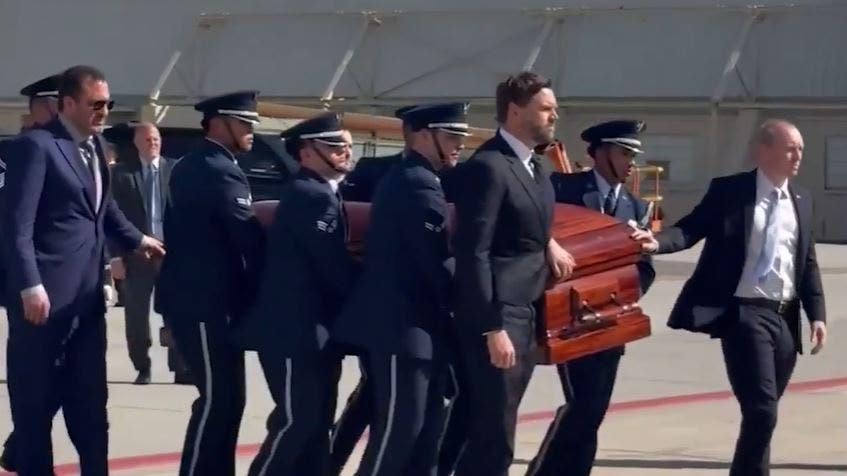A Nation Mourns: The Solemn Journey of Charlie Kirk Home
In a moment of profound national grief, Vice President JD Vance stood in solemn vigil alongside the flag-draped casket of conservative leader Charlie Kirk on Thursday evening in Salt Lake City, Utah. This somber ceremony marked the beginning of a series of tributes to the Turning Point USA founder whose life was cut short by an assassination that has shocked the American political landscape. As a military pallbearer detail carried Kirk’s remains across the tarmac, his wife Erika Frantzve watched with visible emotion, embodying the personal devastation that accompanies such a public tragedy. The scene captured not just the loss of a political figure, but of a husband, friend, and influential voice who had risen to prominence through his passionate advocacy and campus debates.
The journey home aboard Air Force Two represented an unusual and significant gesture, reflecting Kirk’s standing within conservative circles and the gravity with which the administration views his assassination. Upon arriving in Phoenix, Arizona, Frantzve descended from the aircraft holding hands with Second Lady Usha Vance—a human moment of solidarity transcending political boundaries in the face of grief. President Donald Trump announced his intention to attend Kirk’s funeral, expected to take place “next weekend” in Arizona, underscoring both his personal connection to Kirk and the symbolic importance of honoring a figure who had become a standard-bearer for the conservative movement among younger Americans. The decision to transport Kirk aboard the vice presidential aircraft and the president’s planned attendance at his funeral speak to how deeply his death has resonated across the political spectrum.
The circumstances of Kirk’s death have raised troubling questions about security and political violence in America. What began as a routine event—the first stop on Turning Point USA’s “American Comeback Tour” at Utah Valley University—ended in tragedy when an assassin opened fire during the outdoor gathering on Wednesday afternoon. Kirk, known for his provocative and direct style of political engagement, had made his name through campus debates and youth outreach, building one of the most significant conservative student movements in the country. His work represented the kind of democratic engagement that, regardless of political perspective, forms a cornerstone of American civic life—making the violent interruption of that work all the more disturbing for citizens across the political spectrum.
Law enforcement officials have launched an intensive manhunt for the suspect, who they say “blended in well with a college institution.” In images released to the public, the individual appears wearing a hat, sunglasses, and an American flag T-shirt with an eagle on it—a disguise that allowed them to move undetected through a crowd of politically engaged citizens. The FBI has taken the unusual step of offering a $100,000 reward for information leading to the identification and arrest of the person responsible, highlighting both the seriousness with which they view this attack and the challenges they face in apprehending the suspect. FBI Special Agent in Charge Robert Bohls emphasized the critical importance of public assistance, noting that “No tip is too small or too insignificant” as investigators work to piece together the events that led to Kirk’s death.
The assassination has unavoidably raised concerns about the security of political figures in an increasingly polarized America. As the founder of Turning Point USA, Kirk had become one of the most recognizable young conservative voices in the country, known for his confrontational style and unapologetic advocacy. While security measures are common for the highest-ranking government officials, figures like Kirk—influential but without formal government protection—operate in a more vulnerable space. The attack comes at a time of heightened political tensions, following an assassination attempt against former President Trump earlier this year, and prompting renewed discussions about the protection of political figures and the tone of American political discourse. The FBI has established dedicated channels for information gathering, including an online submission form and a hotline, reflecting the all-hands-on-deck approach to solving this crime.
As Kirk’s remains rest at Hansen Memorial Chapel awaiting final arrangements, his death has catalyzed reflection across the political spectrum about the nature of political discourse in America and the very real human costs when that discourse turns violent. Beyond the policy positions he advocated and the organization he built, Kirk was a husband, a friend to many, and a person whose life was cut short at a moment when he was engaged in the fundamental democratic activity of public persuasion. The images of his wife’s grief, the vice president’s solemn escort, and the nation’s collective shock remind us that behind political figures are human beings with loved ones who feel their loss acutely. As the investigation continues and the nation prepares to lay Kirk to rest, Americans face difficult questions about how to engage in passionate political debate while maintaining the mutual respect and nonviolence essential to democratic society—questions that transcend partisan divides and touch on our shared values as a nation.


